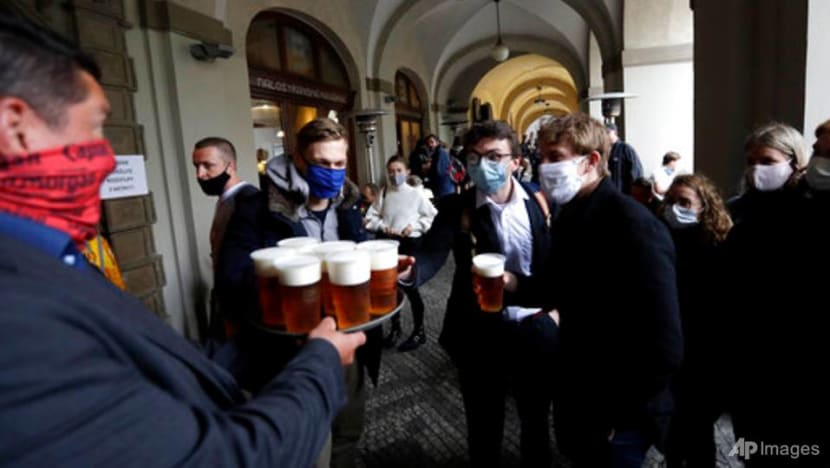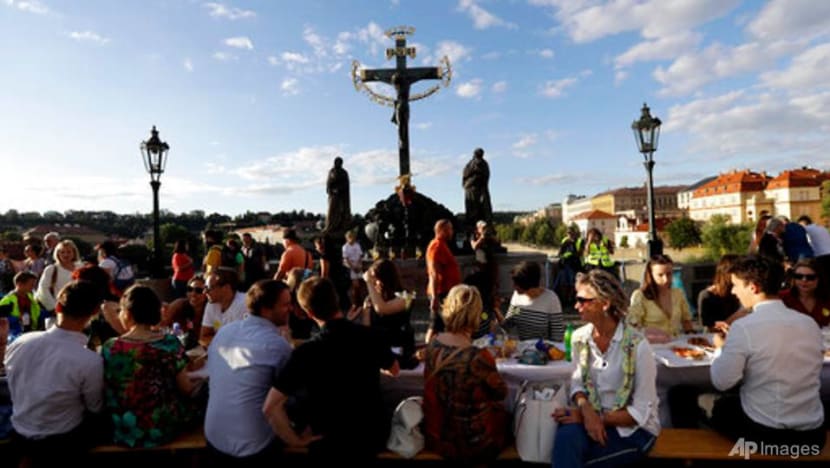Despite pledges, Czechs face second COVID-19 lockdown as system totters

FILE - In this file photo people line up for a beer at a restaurant terrace in Prague, Czech Republic, Monday, May 11, 2020. (AP Photo/Petr David Josek, File)
PRAGUE: Czechs had been assured it wouldn't happen again.
But amid a record surge of coronavirus infections that's threatening the entire health system with collapse, the Czech Republic is adopting on Thursday (Oct 22) exactly the same massive restrictions it slapped on citizens in the spring. Prime Minister Andrej Babis had repeatedly said these measures would never return.
“We have no time to wait,” Babis explained on Wednesday. “The surge is enormous.”
READ: October, November to be 'tougher' with more coronavirus deaths: WHO Europe
Babis apologised for the huge impact the restrictions will have on everyday life but said if they were not taken “our health system would collapse between Nov 7 and 11.”
“I apologise even for the fact that I ruled out this option in the past because I was not able to imagine it might happen,” he added. “Unfortunately, it has happened and now, above all, we have to protect the lives of our citizens.”

The measures include limits on free movement and the closure of many stores, shopping malls and hotels. They will remain in place until at least Nov 3.
The Czech Republic had initially set an example with its effective and fast response when the pandemic first struck, but failed to learn from other countries' subsequent experiences and now faces the consequences.
As the pandemic struck slightly later than in western Europe, Czech authorities gained some breathing space. They used it to impose sweeping restrictions on daily life in March, and - unlike most other European countries - made mask-wearing obligatory in all public areas.
READ: COVID-19 at 'turning point' in Europe, hitting at-risk groups
In April, the country was the first, with Austria, to start to ease restrictions and - again unlike most other European countries - almost completely abandoned them in the summer.
In June, thousands declared victory over the coronavirus at a big party on Prague’s medieval Charles Bridge. Babis, considered a populist leader, was jubilant and told an international conference in August that his country was the “best in COVID,” despite already growing numbers of infected people.
The atmosphere at Wednesday’s news conference, as Babis announced the new measures, was more sober.
“What happened was somehow predicted but nobody expected its scope,” Babis said.
Some experts had called much earlier for strict steps.
READ: Amid COVID-19 surge, WHO urges Europe to step up controls now to save lives
“(Even) yesterday (would have been) late, there’s a danger at every corner,” Jaroslav Flegr, a professor of evolutionary biology who predicted the surge a while ago, told Czech public television.
Many still remember when Babis' then health minister, Adam Vojtech, and his team proposed in August a mandatory return of masks in schools. Babis dismissed that option and fired the minister weeks later when the numbers of new infections started to grow rapidly in September.

They still are.
Confirmed cases hit new record levels of almost 12,000 on Tuesday. That was almost 900 more than the previous record set on Friday.
Since the start of the pandemic, the Czech Republic has registered 193,000 confirmed infections, about one third of them in the past seven days, and 1,619 people have died - with a record 97 deaths registered on Monday.
The seven-day rolling average of daily new cases has risen over the past two weeks from 29.6 per 100,000 people on Oct 6 to 85.6 per 100,000 people on Tuesday.












